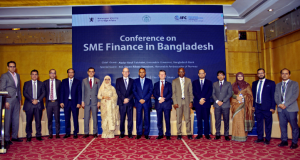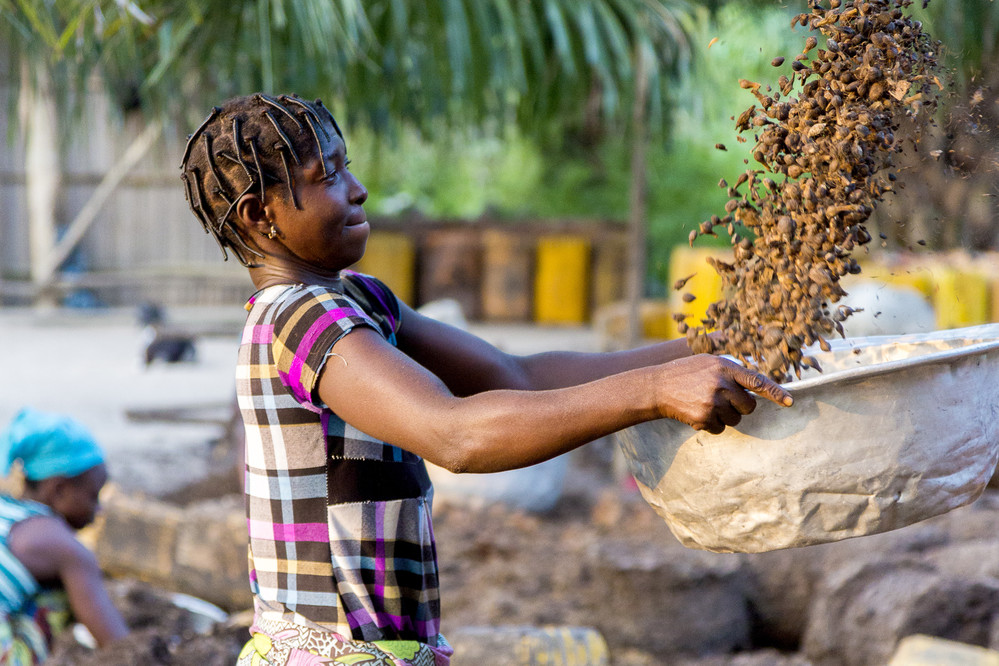
To explore the various aspects of financing for small and medium enterprises (SMEs) in Bangladesh, IFC, in association with Bangladesh Bank and the government of Norway, organized a conference in Dhaka. Experts, policymakers, and stakeholders from across the world shared their insights to help foster a resilient and inclusive environment for SME financing in the country.
The event touched upon the partnership between IFC and Bangladesh Bank, results of an impact assessment study carried out on women owned SMEs, next generation SME financing trends, and global best practices in SME financing. It also addressed the challenges and opportunities in SME financing, identifying solutions and innovations in light of global SME finance developments.
In Bangladesh, the micro, small, and medium enterprises (MSME) sector faces a financing gap of $2.8 billion. With nearly 10 million SMEs contributing to about 25 percent of GDP, enhancing SME financing is key to boosting economic growth.
Highlighting the joint efforts of IFC and Bangladesh Bank in SME financing, the conference showcased initiatives, including developing the country’s first Credit Guarantee Scheme (CGS), reforming an SME finance policy, and strengthening the sector’s capacity.
IFC’s impact study on CGS, supported by the Norwegian Embassy, revealed that the number of first-time borrowers receiving loans in Cottage, Micro and Small enterprises, and the average ticket size of the loans for women owned Micro and Small enterprises was statistically significantly higher after the launch of CGS than ever before. Women entrepreneurs who received CGS-backed loans reported that it helped their business survive amid crises and provided new impetus to thrive.
Speaking at the conference as Chief Guest, Governor of Bangladesh Bank, Abdur Rouf Talukder, said, “Recognizing that cottage, micro, small and medium enterprises (CMSMEs) are the backbone of society, Bangladesh Bank is spearheading several initiatives to mainstream medium and small businesses into the financial landscape. This includes establishing a new and dedicated Credit Guarantee Department that has already piloted an online platform—the Credit Guarantee Information Management System—to help lodge applications seamlessly. We are at an important crossroads of economic development and must ensure that everyone, especially those who often get left out, can be part of the financial picture.”
Deputy Governor of Bangladesh Bank, Abu Farah Md. Nasser, said, “A strong SME sector is akin to a superpower for creating jobs, export earnings and productive proficiency. Now more than ever, we need to work together to enhance credit guarantee schemes, tap into alternative databases for SME lending, and ultimately fast-track CMSME finance in Bangladesh. We want to bridge the gap between rich and poor, make sure men and women have equal opportunities, and boost economic growth across the country.”
Martin Holtmann, IFC Country Manager for Bangladesh, Bhutan, and Nepal, said, “Bangladesh is rapidly accelerating its economic development and creating more and better jobs is a priority we share with the country as long-term partners since 1985. IFC’s collaboration with Bangladesh Bank to develop SME solutions highlights a milestone in achieving financial inclusion and economic advancement and underscores the transformative power of partnerships, innovation, and our collective commitment to progress. We aim to increase access to financial products that are affordable, sustainable, and responsive to risks while developing institutional, operational, and policy frameworks to ensure the benefits of economic growth permeate every facet of this dynamic nation.”
His Excellency Espen Rikter-Svendsen, Ambassador of the Royal Norwegian Embassy in Bangladesh, said, “Lack of access to finance is the biggest impediment to the growth of SMEs in Bangladesh, particularly for the women-headed SMEs. Recognizing and addressing the challenges faced by SMEs and women entrepreneurs is not just a matter of economic significance but also a step towards fostering gender equality. It is essential to create an environment that facilitates easier access to finance for SMEs, encourages more women to take on entrepreneurial roles and provides them with the necessary financial resources to succeed.”
Other participants included Qamar Saleem, CEO of the SME Finance Forum, Abdoulaye Seck, Country Director of the World Bank for Bangladesh and Bhutan, and managing directors and CEOs of leading banking and non-banking financial institutions in Bangladesh.
The event also included technical sessions and panel discussions focusing on global best practices and a future roadmap to accelerate the SME financing market in Bangladesh.
About IFC
IFC — a member of the World Bank Group — is the largest global development institution focused on the private sector in emerging markets. We work in more than 100 countries, using our capital, expertise, and influence to create markets and opportunities in developing countries. In fiscal year 2023, IFC committed a record $43.7 billion to private companies and financial institutions in developing countries, leveraging the power of the private sector to end extreme poverty and boost shared prosperity as economies grapple with the impacts of global compounding crises. For more information, visit www.ifc.org
Stay Connected with IFC on social media
This article was originally published by: IFC

